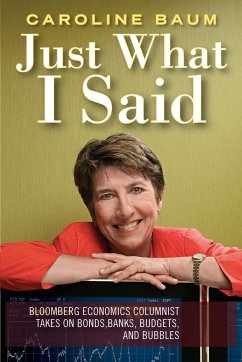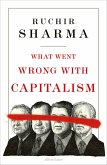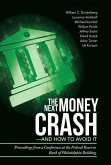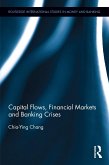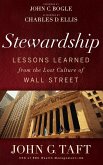Caroline Baum
Just What I Said
Bloomberg Economics Columnist Takes on Bonds, Banks, Budgets, and Bubbles
21,99 €
inkl. MwSt.
Versandfertig in über 4 Wochen

11 °P sammeln
Caroline Baum
Just What I Said
Bloomberg Economics Columnist Takes on Bonds, Banks, Budgets, and Bubbles
- Broschiertes Buch
- Merkliste
- Auf die Merkliste
- Bewerten Bewerten
- Teilen
- Produkt teilen
- Produkterinnerung
- Produkterinnerung
"Analysis and commentary on economics, the Federal Reserve, monetary policy, the bond markets, and politics, selected from among 1,300 columns written by Caroline Baum since 1998 for Bloomberg News, the electronic business and financial news service." Economic conditions, Finance, and Economics.
Andere Kunden interessierten sich auch für
![What Went Wrong With Capitalism What Went Wrong With Capitalism]() Ruchir SharmaWhat Went Wrong With Capitalism27,99 €
Ruchir SharmaWhat Went Wrong With Capitalism27,99 €![The Next Money Crash-and How to Avoid It The Next Money Crash-and How to Avoid It]() Uli KortschThe Next Money Crash-and How to Avoid It30,99 €
Uli KortschThe Next Money Crash-and How to Avoid It30,99 €![The Oxford Handbook of Banking The Oxford Handbook of Banking]() The Oxford Handbook of Banking253,99 €
The Oxford Handbook of Banking253,99 €![Monetary Policy Monetary Policy]() Peter BofingerMonetary Policy316,99 €
Peter BofingerMonetary Policy316,99 €![Capital Flows, Financial Markets and Banking Crises Capital Flows, Financial Markets and Banking Crises]() Chia-Ying ChangCapital Flows, Financial Markets and Banking Crises200,99 €
Chia-Ying ChangCapital Flows, Financial Markets and Banking Crises200,99 €![Stewardship Stewardship]() John G. TaftStewardship25,99 €
John G. TaftStewardship25,99 €![Understanding Regulation Understanding Regulation]() Robert BaldwinUnderstanding Regulation139,99 €
Robert BaldwinUnderstanding Regulation139,99 €-
-
-
"Analysis and commentary on economics, the Federal Reserve, monetary policy, the bond markets, and politics, selected from among 1,300 columns written by Caroline Baum since 1998 for Bloomberg News, the electronic business and financial news service." Economic conditions, Finance, and Economics.
Hinweis: Dieser Artikel kann nur an eine deutsche Lieferadresse ausgeliefert werden.
Hinweis: Dieser Artikel kann nur an eine deutsche Lieferadresse ausgeliefert werden.
Produktdetails
- Produktdetails
- Verlag: Wiley
- Seitenzahl: 318
- Erscheinungstermin: 1. August 2005
- Englisch
- Abmessung: 234mm x 156mm x 17mm
- Gewicht: 485g
- ISBN-13: 9781576602195
- ISBN-10: 1576602192
- Artikelnr.: 21893139
- Herstellerkennzeichnung
- Libri GmbH
- Europaallee 1
- 36244 Bad Hersfeld
- gpsr@libri.de
- Verlag: Wiley
- Seitenzahl: 318
- Erscheinungstermin: 1. August 2005
- Englisch
- Abmessung: 234mm x 156mm x 17mm
- Gewicht: 485g
- ISBN-13: 9781576602195
- ISBN-10: 1576602192
- Artikelnr.: 21893139
- Herstellerkennzeichnung
- Libri GmbH
- Europaallee 1
- 36244 Bad Hersfeld
- gpsr@libri.de
Caroline Baum has been a columnist at Bloomberg News since 1998. She has been writing about the economy and the bond market since 1987. In 2004 and 2005, she received first-place National Headliner Awards in the wire service/commentary category.
Preface
Acknowledgments.
Introduction.
1 Ye of Little Faith.
Why the Federal Reserve gets so much attention, yet so little credit, for
the outcomes it effects.
2 The Bubble, or This Time Really Is Different!
Like terminally ill patients, the late 1990s bubble in technology and
Internet stocks passed through the five stages of dying: denial, anger,
bargaining, depression, acceptance. It didn't turn out any better for the
market.
3 Still Nonsense After All These Years.
Driving a stake through the heart of popular delusions: Why acts of God
aren't good for growth, costs don't push up inflation, and demand in the
economy isn't finite.
4 Myths Under the Microscope.
Repeating something often enough doesn't make it true. You'd never know it
from the misconceptions that survive about tax cuts, trade, and liquidity
traps.
5 First Principles.
How the Pilgrims learned about the value of incentives, and how backyard
birding sheds light on the law of supply and demand.
6 Understanding the Yield Curve.
One rate is set by the central bank, the other by the market. The message
couldn't be simpler, which is probably why most economists ignore it.
7 The "Political" Economy.
What happens when the heavy hand of government tries to intrude on the
invisible hand of the market.
8 Sir Alan.
To some, he's a man for all seasons, a knight for all ages. To others, he's
the emperor with no clothes. His day job is chairman of the Federal Reserve
Board.
9 What Would We Do Without a Dollar Policy?
How an insipid slogan morphed into a policy, and why we are stuck with it.
10 Off the Charts.
Sexagenarians bracket the big bull market in bonds, while technical traders
are blindsided by the canoe over the waterfall.
11 Odd Ducks.
It's a challenge to ring out the year on a creative note, but sniffing out
a shaggy dog story from Petsmart is a slam dunk.
12 Oil Things to Oil People.
We can't live without it, but we don't seem to understand it: Why the Fed
can't sign over monetary policy to OPEC.
13 Rewriting History.
Politicians never let the facts stand between them and a little historical
revisionism.
14 Men in Black.
Who are the Plunge Protection Team, and what are they doing in the
financial markets?
15 No One Else Would Write About This.
Why automated phone menus and other productivity-enhancing devices are a
headache for the consumer and an unmeasured form of inflation.
16 Love Affair.
Why bonds like to hook up and even fall in love.
17 Bumbling Bureaucrats.
How an international lending agency reinvented itself as an überadviser
once it had outlived its purpose.
18 The 2004 Election.
Why a presidential candidate has to run as somebody, not as
anybody-but-his-opponent.
19 Readers Write Back at You.
Readers send their unedited thoughts into cyberspace, never expecting
anyone to read them or reply.
Index.
Acknowledgments.
Introduction.
1 Ye of Little Faith.
Why the Federal Reserve gets so much attention, yet so little credit, for
the outcomes it effects.
2 The Bubble, or This Time Really Is Different!
Like terminally ill patients, the late 1990s bubble in technology and
Internet stocks passed through the five stages of dying: denial, anger,
bargaining, depression, acceptance. It didn't turn out any better for the
market.
3 Still Nonsense After All These Years.
Driving a stake through the heart of popular delusions: Why acts of God
aren't good for growth, costs don't push up inflation, and demand in the
economy isn't finite.
4 Myths Under the Microscope.
Repeating something often enough doesn't make it true. You'd never know it
from the misconceptions that survive about tax cuts, trade, and liquidity
traps.
5 First Principles.
How the Pilgrims learned about the value of incentives, and how backyard
birding sheds light on the law of supply and demand.
6 Understanding the Yield Curve.
One rate is set by the central bank, the other by the market. The message
couldn't be simpler, which is probably why most economists ignore it.
7 The "Political" Economy.
What happens when the heavy hand of government tries to intrude on the
invisible hand of the market.
8 Sir Alan.
To some, he's a man for all seasons, a knight for all ages. To others, he's
the emperor with no clothes. His day job is chairman of the Federal Reserve
Board.
9 What Would We Do Without a Dollar Policy?
How an insipid slogan morphed into a policy, and why we are stuck with it.
10 Off the Charts.
Sexagenarians bracket the big bull market in bonds, while technical traders
are blindsided by the canoe over the waterfall.
11 Odd Ducks.
It's a challenge to ring out the year on a creative note, but sniffing out
a shaggy dog story from Petsmart is a slam dunk.
12 Oil Things to Oil People.
We can't live without it, but we don't seem to understand it: Why the Fed
can't sign over monetary policy to OPEC.
13 Rewriting History.
Politicians never let the facts stand between them and a little historical
revisionism.
14 Men in Black.
Who are the Plunge Protection Team, and what are they doing in the
financial markets?
15 No One Else Would Write About This.
Why automated phone menus and other productivity-enhancing devices are a
headache for the consumer and an unmeasured form of inflation.
16 Love Affair.
Why bonds like to hook up and even fall in love.
17 Bumbling Bureaucrats.
How an international lending agency reinvented itself as an überadviser
once it had outlived its purpose.
18 The 2004 Election.
Why a presidential candidate has to run as somebody, not as
anybody-but-his-opponent.
19 Readers Write Back at You.
Readers send their unedited thoughts into cyberspace, never expecting
anyone to read them or reply.
Index.
Preface
Acknowledgments.
Introduction.
1 Ye of Little Faith.
Why the Federal Reserve gets so much attention, yet so little credit, for
the outcomes it effects.
2 The Bubble, or This Time Really Is Different!
Like terminally ill patients, the late 1990s bubble in technology and
Internet stocks passed through the five stages of dying: denial, anger,
bargaining, depression, acceptance. It didn't turn out any better for the
market.
3 Still Nonsense After All These Years.
Driving a stake through the heart of popular delusions: Why acts of God
aren't good for growth, costs don't push up inflation, and demand in the
economy isn't finite.
4 Myths Under the Microscope.
Repeating something often enough doesn't make it true. You'd never know it
from the misconceptions that survive about tax cuts, trade, and liquidity
traps.
5 First Principles.
How the Pilgrims learned about the value of incentives, and how backyard
birding sheds light on the law of supply and demand.
6 Understanding the Yield Curve.
One rate is set by the central bank, the other by the market. The message
couldn't be simpler, which is probably why most economists ignore it.
7 The "Political" Economy.
What happens when the heavy hand of government tries to intrude on the
invisible hand of the market.
8 Sir Alan.
To some, he's a man for all seasons, a knight for all ages. To others, he's
the emperor with no clothes. His day job is chairman of the Federal Reserve
Board.
9 What Would We Do Without a Dollar Policy?
How an insipid slogan morphed into a policy, and why we are stuck with it.
10 Off the Charts.
Sexagenarians bracket the big bull market in bonds, while technical traders
are blindsided by the canoe over the waterfall.
11 Odd Ducks.
It's a challenge to ring out the year on a creative note, but sniffing out
a shaggy dog story from Petsmart is a slam dunk.
12 Oil Things to Oil People.
We can't live without it, but we don't seem to understand it: Why the Fed
can't sign over monetary policy to OPEC.
13 Rewriting History.
Politicians never let the facts stand between them and a little historical
revisionism.
14 Men in Black.
Who are the Plunge Protection Team, and what are they doing in the
financial markets?
15 No One Else Would Write About This.
Why automated phone menus and other productivity-enhancing devices are a
headache for the consumer and an unmeasured form of inflation.
16 Love Affair.
Why bonds like to hook up and even fall in love.
17 Bumbling Bureaucrats.
How an international lending agency reinvented itself as an überadviser
once it had outlived its purpose.
18 The 2004 Election.
Why a presidential candidate has to run as somebody, not as
anybody-but-his-opponent.
19 Readers Write Back at You.
Readers send their unedited thoughts into cyberspace, never expecting
anyone to read them or reply.
Index.
Acknowledgments.
Introduction.
1 Ye of Little Faith.
Why the Federal Reserve gets so much attention, yet so little credit, for
the outcomes it effects.
2 The Bubble, or This Time Really Is Different!
Like terminally ill patients, the late 1990s bubble in technology and
Internet stocks passed through the five stages of dying: denial, anger,
bargaining, depression, acceptance. It didn't turn out any better for the
market.
3 Still Nonsense After All These Years.
Driving a stake through the heart of popular delusions: Why acts of God
aren't good for growth, costs don't push up inflation, and demand in the
economy isn't finite.
4 Myths Under the Microscope.
Repeating something often enough doesn't make it true. You'd never know it
from the misconceptions that survive about tax cuts, trade, and liquidity
traps.
5 First Principles.
How the Pilgrims learned about the value of incentives, and how backyard
birding sheds light on the law of supply and demand.
6 Understanding the Yield Curve.
One rate is set by the central bank, the other by the market. The message
couldn't be simpler, which is probably why most economists ignore it.
7 The "Political" Economy.
What happens when the heavy hand of government tries to intrude on the
invisible hand of the market.
8 Sir Alan.
To some, he's a man for all seasons, a knight for all ages. To others, he's
the emperor with no clothes. His day job is chairman of the Federal Reserve
Board.
9 What Would We Do Without a Dollar Policy?
How an insipid slogan morphed into a policy, and why we are stuck with it.
10 Off the Charts.
Sexagenarians bracket the big bull market in bonds, while technical traders
are blindsided by the canoe over the waterfall.
11 Odd Ducks.
It's a challenge to ring out the year on a creative note, but sniffing out
a shaggy dog story from Petsmart is a slam dunk.
12 Oil Things to Oil People.
We can't live without it, but we don't seem to understand it: Why the Fed
can't sign over monetary policy to OPEC.
13 Rewriting History.
Politicians never let the facts stand between them and a little historical
revisionism.
14 Men in Black.
Who are the Plunge Protection Team, and what are they doing in the
financial markets?
15 No One Else Would Write About This.
Why automated phone menus and other productivity-enhancing devices are a
headache for the consumer and an unmeasured form of inflation.
16 Love Affair.
Why bonds like to hook up and even fall in love.
17 Bumbling Bureaucrats.
How an international lending agency reinvented itself as an überadviser
once it had outlived its purpose.
18 The 2004 Election.
Why a presidential candidate has to run as somebody, not as
anybody-but-his-opponent.
19 Readers Write Back at You.
Readers send their unedited thoughts into cyberspace, never expecting
anyone to read them or reply.
Index.
